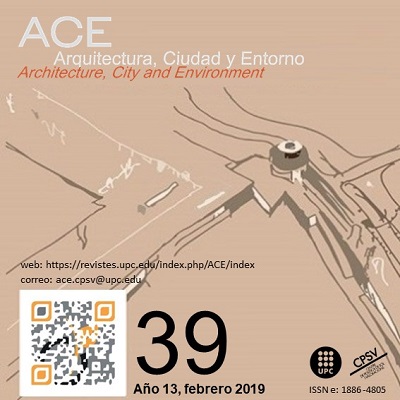When nature is the driver: rethinking ecological design in architecture
DOI:
https://doi.org/10.5821/ace.13.39.5671Keywords:
Pragmatism, ecosystemic architecture, political ecology, nature, symmetric anthropologyAbstract
Objective
Evolution of the architectural technique has been considered by Modernity as an ideal aiming at controlling nature under men’s purposes. Although this anthropocentric paradigm is still very much in force, new visions qualify this approach to technique and nature as restricted. In this article, it’s endorsed a different way of facing architectural design based on negotiation scenarios that introduce natural hazards as an active negotiation driver in the ecological design.
Methodology
The article explores ecological design strategies distanced from anthropocentrism, by systematizing selected architectural study cases. The analysis is done by questioning the deterministic heritage of science, according to M. Serres assumptions. As defended by M. Serres, Nature is assimilated by The Social Contract of J.J. Rousseau, establishing new discussion frameworks. These new discussion frameworks drive into different liaisons between humans and non-humans, by a later influence of P. Descola and B. Latour. This approach to ecological design in architecture reformulates a classic topic in social sciences: the relationship between nature and culture.
Conclusions
After reflecting on selected examples of ecological design the article concludes, firstly by stating that ecologic design is not in crisis as suspected, but the relationship that designers and architects have with it, which is still pre-modern and almost religious; and secondly by identifying nature as an ally instead of an enemy in ecological design, following pragmatism premises.
Originality
Its originality is based on its critical contribution on the design process and its impact in terms of significance. The main conclusion of the article opens a potential field of investigation and a required reflection from practitioners.
Downloads
Published
Issue
Section
License
| INTELECTUAL PROTECTION CRITERIA |
At this moment, it is count with the "Oficina Española de Patentes y Marcas", while global protection it is being processed by the World Intelectual Property Organization (OMPI/WIPO). Nevertheless the International Standard Serial Number Office (ISSN) has given the following numbers ISSN: 1886-4805 (electronic version) and 1887-7052 (paper version). All articles will be peer reviewed, using double blind reviewing. |
| COPYRIGHT |
The article contents and their comments are authors exclusive liability, and do not reflect necessarily the journal editor commitee's opinion. All ACE published works are subject to the following licence CC BY-NC-ND 3.0 ES http://creativecommons.org/licenses/by-nc-nd/3.0/es/ It implies that authors do not hold nor retain the copyright without restrictions but only those included in the licence. |


































